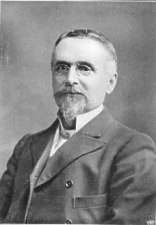
Mr Thos P Ellison
[from History of IoMSPCo, 1904]
We have now to refer briefly to the personnel of the Company. Its most important members are, of course, the Directors, as, subject to the control of the Shareholders, they are the rulers of the Company. But they are, however, almost equally of course, the least interesting, for, whatever its members may be as individuals, a "Board " collectively can never be attractive (1). We have, however, no hesitation in saying that the Company has, from time to time, been able to command the services of many of the most capable men in the Island as its Directors.
Next in importance come the Agents (2). The first Agent in Douglas was EDWARD MOORE. He held that office till his death in 1865. " During that period," writes Mr. John J. Goldsmith, who knew him well, " he devoted all his business capacity to the advancement of the Company's interests, and his efforts in that direction were rewarded by their success". A motion was carried at a meeting of the shareholders that a monument should he erected by the Company in Braddan Churchyard in token of the high esteem in which he was held, but his family declined it. His place was taken by Mr. JOHN J. GOLDSMITH, for many years a clerk in the office, who resigned in 1879, and is now a Director of the Company. He was succeeded by Mr. THOMAS P. ELLISON, the present " Secretary and Manager," as the Agent is now called.

Mr Thos P Ellison
We have already seen that there were two Manx firms in Liverpool who were shipbrokers and agents for Manx trading vessels (3). MARK QUAYLE, the junior partner of one of these firms—Mark Quayle &: Son—which still continued its agency for the sailing vessels, was the Company's first Agent in Liverpool. He died at Penzance in December, 1833, and was succeeded by JAMES DUFF, whose tenure of the office was also a brief one, since T. D. MOORE and J. CHRISTIAN appear as Agents in January, 1835. The date of Christian's death or retirement has not been recorded, all we know being that T. D. Moore is found as sole Agent in 1846. He was the fifth son of James Moore, of Cronkbourne, one of the founders of the Company. On his death at the early age of thirty nine, in 1851, he was succeeded by THOMAS ORFORD, who held the agency for fifty two years.
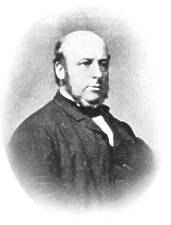
Mr Thomas Orford
Thomas Orford's first mercantile experience was gained with John Bibby & Co., whose vessels were in the Mediterranean trade, and in the coasting trade between Liverpool and Dublin. He entered James Duff's office before Duff was appointed Agent to the Isle of Man Steam Packet Company, and, in 1835, he commenced business as a shipbroker at 15, Nova Scotia, in the premises previously occupied by M. H. Quayle & Son. Thomas Orford was joined by his sons, Joseph and Thomas, in 1865 and 1867, respectively, but he maintained an active interest in the affairs of the agency till within a very few years of his death in 1903, at the patriarchal age of 92. His services to the Company during his long and honourable connection with it had been of very great value, and his sons, Messrs. THOMAS & JOSEPH ORFORD, the present Agents of the Company in Liverpool, received a letter from the Directors testifying their appreciation of them in eulogistic terms.
One of the most potent causes of the success of the isle of Man Steam Packet Company is the fact that it has always insisted on having first-class officers and men on board its steamers. Space will allow us to refer only to those who have reached the rank of captain (4), and We do not propose to give an account of any of the captains at present in the Company's service, or of those who have retired from it and are still living, but only of those who have died. In doing so, it is quite unnecessary to record the fact that each and everyone of them was an excellent navigator and seaman, because it may be taken for granted that no captain could have long retained his position if he had not been endowed with those capacities.
Let us quote the Rev. T. E. Brown's opinion of them: " I think I knew all the old captains of the Isle of Man Steam Packet Company's service .... they were grand old fellows. They differed in point of ability, of temper, of social aptness, and popular ways. But they were all of them men and gentlemen. It is remarkable that the Service should have turned out a type of officer so uniformly courteous and efficient. The sea, we all know, has a natural tendency to produce magnanimity, courage, and generosity. But that these qualities should have been so invariably combined in the case of men springing for the most part from the ranks; that one after another, as he succeeded to a post, however honourable, should have done both it and himself such ample justice, is, to say the least, very noteworthy. One feels that it is something to be a Manx captain, and that to be a captain in the service of the Isle of Man Steam Packet Company is not far from a patent of nobility, I had almost said, by hereditary descent " (5).
Of all the Company's captains, the most notable is—
WILLIAM GILL (b. 1795, d. 1858). He is the most notable, not because of any superiority of seamanship to his successors, but because he was the Company's first captain, and because he was the hero of the two famous struggles with the "St. George " and the "Monarch " Companies. We call him the first captain because, though Robert Crawford, captain of the " Enterprise,' a small steamer on the Liverpool and Glasgow Station, was appointed commander of the "Mona's Isle," he, for some reason now unknown, never acted in that capacity. The Manx Company, then, began with a Manx captain and very fortunate it was in its selection. William Gill was brought up in Ramsey to the trade of a ship carpenter, but he soon took to the sea. He had previously been in command of the sailing vessels "Duchess of Atholl " and " Douglas," which, as we have seen, plied between Liverpool and Douglas, and he left the latter vessel to come to the "Mona's Isle". He had thus gained a long experience of the port of Liverpool, which " was not lit and buoyed and dredged and circumscribed as it is to-day " (5). The " Rock Channel " was used until Gill "discovered the present route, and the Crosby and Queen's Channels are but the pioneering track he took into the port, and for which his reward was a service of plate, presented by Liverpool's shipowners and the proprietors of her docks " (5). Early in 1832, £100 was presented to Captain Gill by the shareholders " in testimony of their high regard for his services in the command of the 'Mona's Isle,' and particularly for his unprecedented perseverance in effecting a passage on the memorable 19th of August during a gale of wind from the N.N.W., which prevented their opponent the 'William the Fourth' from leaving the port of Douglas " (a).
In September, 1835, he was dismissed by the Directors because it is said that he declined to go to sea one day when his brother was dying. In the following month, however, a meeting of the shareholders was held for the purpose of investigating the cause of this dismissal, and it was resolved " that the Company do consider that Captain Gill has not been dismissed, and that he be requested to take command of the 'Queen of the Isle' as heretofore " (a). Upon the passage of this motion, the Directors declined ' to give any satisfaction to the Company for the dismissal of Captain Gill." The Shareholders then promptly passed a further motion to the effect that " in consequence of the injudicious management of the affairs of the Company by the Directors for the last two months, they be dismissed " (a). This motion was carried by eighty-one votes to five. On Gill's retirement, in 1852, he was thanked by the Directors for " the judicious and satisfactory manner in which he had commanded the vessels under his care " (a)
Six years later he was buried in Braddan Churchyard. The Rev. T. E. Brown says that he bore " the reputation of a fine commander, a true modest gentleman and sailor," and that he " left in the hearts of us boves [boys] the devoted affection of the many generations who had grown up to love and admire him" (6).
EDWARD QUAYLE (b. 1803, d. 1862), who had, like Gill, been a commander of the Manx sailing packets, and was second mate on the " Mona's Isle " with him, may fairly be described as the Company's second captain, since Milligan, a Scotsman and first mate of the " Mona's Isle," the first captain to be appointed to the " Mona," had only held that post a few weeks when Quayle, who was then his first mate, succeeded him. He became commodore in 1852, and he held that position till he resigned in 1861. His last command was the famous " Douglas " (I.). The Rev. T. E. Brown remarks that he " was a true sea-dog, rough and resolute " (7). The following tale (which seems to us to be a very unlikely one) was told of him, when in command of the " Mona's Queen ": - It was a terrible passage, and the captain walked into the saloon and said, " Gentlemen, we shall all be in Heaven in five minutes ", whereupon a well-known Manx ecclesiastic ejaculated, " God forbid!" On his death, the Directors bore testimony to 'the self-sacrificing anxiety with which he laboured to promote the welfare of the Company (a). The epitaph on his tombstone in Braddan Churchyard declares him to have been " a prompt, fearless, faithful and brave sailor, who felt and acted like a man." He was succeeded as commodore and captain of the " Douglas '' 'by
JOHN KERMODE (b. 1802, d. 1878), a Peel man. He commanded in succession, the " Mona," the "King Orry," the " Ben-my-Chree," the " Mona's Queen," and the " Douglas." " On all these," says the Rev. T. E. Brown, " I have sailed with him, been cheered and reassured by his manly presence, and rejoiced in the few hearty words with which it was his pleasure to accost me. No commodore in the Company's service ever inspired more confidence, or had warmer or more attached friends"(8). He retired in 1864, when he received " a service of plate in appreciation of the manner in which he had fulfilled his duties for a period of nearly thirty years "(a).
WILLIAM McFIE (b. 1804, d. 1860) was a native of Rothesay, in the Isle of Bute. He became first mate of the " Queen of the Isle " in 1835, and captain of the " Mona's isle " in 1842. After the " Mona's Isle" was broken up in 1851, he was appointed the Company's " Supercargo " in Liverpool. He is said to have been a well-educated and scholarly man (9).
JOSEPH SKILLICORN (b. 1811, d. 1877) had been for some years in the Company's employ as mate, when, in 1854, he took command of the " Ellan Vannin" belonging to the Castletown Company. After her disappearance, he was appointed first mate of the " Tynwald " (I.), and, some years later, he became captain of the " Mona's Isle " (II.) (now the " Ellan Vannin"). Bluffness, quaintness, and good humour were his main characteristics. The Rev. T. E. Brown speaks of him as " honest old Joe," and relates the following anecdote about him: " I remember sailing with him one day from Ramsey to Douglas. The captain was sitting on an inverted bucket, cutting some tobacco. We were passing under Kirk Onchan. ' Do you know the old name ?' he said. 'Yes,' I replied, 'Kionedroghad.' 'Do you remember Parson Craine?' 'Of course I do,' said I, 'he was my got/father.' 'Well,' said the captain, 'that's the first man that ever hove the water in my face!"' (i.e., baptized him) (10). He lies in Braddan Churchyard, and some of his friends erected a tombstone to his memory, whereon is the following epitaph:
" Here at anchor I do lay
With many of our fleet,
In hope again for to set sail
Our admiral, Christ, to meet."
WILLIAM FELL: (b. 1811, d. 1881) (b) was born at Ballacain, Onchan, and was the second of the Isle of Man Steam Packet Company's captains who served his time as a ship's carpenter. He did so in Winram's yard, where he took part in building the " King Orry," and he went with her as carpenter to Glasgow to overlook the setting of the engines. Soon afterwards, he joined the service of the Company, and after a time became mate of the " Tynwald," then of the " Douglas," and finally of the " Snaefell " (I.). His first command was on the " Mona's Queen," and from her he went to the " Mona's Isle " (II.) (now the " Ellan Vannin "). His knowledge of carpentering proved valuable to the Company, since the Directors were able to employ him to superintend the building of new steamers, with perfect confidence that no scamped work would escape him. The last steamer whose building he thus superintended was the present " Snaefell."
Between 1853 and 1860, we find the names of three men—GRIER, ROBINSON, and HIGGINSON— who were captains for brief periods, though the two latter had been in the Company's service as mates for several years. These were the last of the old school of captains. After this time the officers who entered the Company's service had to obtain a " Board of Trade certificate." We will briefly explain how this came about.
In 1854, an Imperial Act was passed (12) under which the Board of Trade was empowered to institute examinations for all who desired to hold the position of master or mate. Those who passed these examinations were entitled to a "certificate of competency " as master or mate, as the case might he, everyone having to pass as mate before he could get a master's certificate. Without these certificates they could not hold either office, unless they had been "master " or " mate " before 1851, when they were presented with what was called a "certificate of service," a specimen of which we give below (13).
No mate, however, who had only a " certificate of service " could rise to the rank of master till he had passed the examination entitling him to hold the " certificate of competency " for that rank.
The first officer in the Company's service to hold a " certificate of competency " was Alexander McQueen, a Wigtonshire man, who joined the service in 1860 as captain of the " Tynwald " (I), and ultimately became commodore., but since he is, we are pleased to say, alive and " hearty," we shall, in accordance with our rule not to comment on the doings of living men, content ourselves with mentioning his name.
THOMAS CORLETT(b. 1817, d. 1890), a Douglas man, was apprenticed to the sea. His first service was between Liverpool and Montreal, and he remained in it for thirteen years, rising to the rank of master. On leaving it he was appointed as sailing-master (the owner, William Cubbon, being captain) of the schooner "Vixen", of Peel, which sailed from Peel to Australia with a number of natives of the Island (chiefly miners from Foxdale) who were bound for the goldfields of Ballarat. During the greater part of the voyage,Corlett was confined to his cabin with rheumatic fever, and as the captain was not a trained navigator, he had to be brought up on deck each day in order to take observations, and to correct or set the course. His next trip was also to Australia with emigrants, and in another Peel schooner, the "Maggie," which he commanded. He then took charge of the trader " Eleanor," which was engaged in the Liverpool and Douglas cargo trade. About 1856 he entered the Isle of Man Steam Packet Company's service as mate, becoming captain in due course. His last command was the first " Snaefell." After leaving the Company, he was for a short time assistant harbour master in Douglas.
ROBERT GIBSON (b. 1829, d. 1890) was a native of Port William, Wigtonshire. He began his seafaring life at an early age in small coasting vessels. Then, in company with an elder brother, he went to South America, where they built a small schooner called " The Brothers," which they sailed across the Atlantic and sold on their return to England. Robert Gibson thereupon returned to the coasting trade, and, in 1861, joined the Company's service as first mate with Captain McQueen. In 1864 he became captain of the " Tynwald " (I.), and he afterwards commanded several of the Company's vessels, the last being the present " Ben-my-Chree." The writer in his schoolboy days frequently crossed with him when he was captain of the " Douglas" (II.), with William Ruthven as first mate, and Alick Reid, the present captain of the "Queen Victoria," as second mate, and has a pleasant recollection of the kindness and consideration he displayed to his passengers. Retiring from the service owing to failing health, he went to reside at his native place.
JOHN HILL (b. 1835, d. 1902), like his brother-inlaw, Robert Gibson, was a native of Port William. His first experience of the sea was gained in the coasting trade with his father, and he then went " foreign." He joined the Company in 1865, as first mate of the " Douglas." He was made captain of the " Mona's Queen " (I.) in 1871, and his last command was the present " Mona's Queen " (II.). In 1897 he became commodore in succession to Captain McQueen, who then retired. Of a reserved but very kindly and courteous demeanour, he did much for the popularity of the Fleetwood Station, on which he was employed for about fifteen years. On account of failing eyesight, he retired on the 31st of December, 1900, and died fourteen months later.
THOMAS LEWIN (b. 1837, d. 1889), was born in Onchan. He went to sea in early youth, and, after serving his time, he sailed as an officer in several "foreign" going vessels. In 1864 he entered the Company's service as mate of the " Snaefell " (I.), his brother, William, having been, almost simultaneously, appointed engineer of the same vessel. In 1871 he was appointed captain of this vessel, and he then commanded, successively, the " Douglas " (II)., and the present " Snaefell," " King Orry," and " Ben-my-Chree." The last-named vessel had been under his charge for four years previous to his death.
WILLIAM RUTHVEN (b. 1838, d. 1898) was in the Company's service for forty years, having entered as a sailor before the mast. His first command was the "Mona's Queen " (I.), and, about 1874, he was appointed to the " Mona's Isle " (II.) (" Ellan Vannin "). He had various other commands, among them that of the present " Mona's Isle " (III.). Retiring for a short time because of ill-health, he returned to the service in 1896, and again for a brief period took charge of his first vessel, the " Ellan Vannin " (" Mona's Isle " II.) (14).
JOHN PRITCHARD (b. 1834, d. 1902), a Welshman, came to the Island when a youth, and served as a seaman on a clipper schooner belonging to the late H. B. Noble. He was subsequently given charge of a sailing vessel, and was then, for some time, captain of the " Goldseeker," a well-known trader to and from Douglas. Entering the Company's service as mate, he soon obtained the command of the " Ellan Vannin," and he was appointed to the " Tynwald " (II.) when she first came on the station in 1891.
It is difficult to find fitting epithets to commemorate the services of the last three captains Lewin, Ruthven, and Pritchard — which have not been already applied to their predecessors, so we will content ourselves with remarking that they were gratefully appreciated by their employers and by the passengers they had charge of.
OWEN LEWIS (b. 1841, d. 1903), a very smart officer, commanded the " Queen Victoria" for the " Manx Line." When she and the " Prince of Wales" were purchased by the Isle of Man Steam Packet Company, he was appointed to the latter vessel. In 1890, he went into the service of the " Liverpool and North Wales Line."
But the captains, though the most conspicuous, are, of course, not the only servants of the Company worthy of notice. There are indeed, few Companies which have been so well served by its employés. Its mates hold, almost without exception, "masters"' certificates; its engineers and its shore officials are thoroughly trained and capable; and, as to its sailors, we need only say that they belong to probably the most skilful and daring sea-faring race in the world. We give a portrait of a type of this race—the heroic David Kewley (b. 1850, d. 1904), who was one of the Company's boatmen. Kewley, familiarly known as 'Dawsey,' is said to have saved no less than thirty-five men from drowning. He received some recognition of these achievements in the shape of the Royal Humane Society's testimonial, bronze medal, and certificate. And this reminds us that the personnel of the Company has been, and is, predominantly Manx, though a goodly number of the captains hail from Scotland, mainly from the nearest shore to the Island, that of Wigtonshire. Of the captains who have been in its service, Manxmen number twenty-one, Scotsmen, eight; Englishmen, three,Welshmen, two; and there is one Irishman. It will be observed that we are able to give the portraits of nearly all of them.
In the lower ranks, the proportion of Manxmen is even greater. We regret that space will not permit us to record the many excellent mates, engineers, and others whom the Company has had in its employ. But, even if we could do so, we suspect that such a record would not be of any great interest to the public. The captain is the man that looms large in the general estimation. He even gets the credit for a fast passage, or the discredit for a slow one!
We will now give a brief account of the various premises occupied by the Company in Douglas and Liverpool.
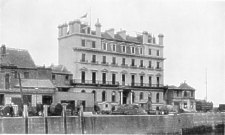
Douglas Offices
DOUGLAS.—Till 1846, it had its offices on the site which is now occupied by the "Lancashire House," but in that year Mrs. Bell's herring curing establishment on the Quay was bought, and the office, which still exists there, erected. In 1867, the Pier Inn was purchased, and made part of the Company's premises. In 1880, the same fate fell upon the Imperial Stables and Yard. Further purchases were: (I) In 1887, the Imperial Hotel, on the Red Pier, where the chief offices of the Company are now placed; (2) in 1890, the Bath Place Yard; and (3) in 1893, the "Eiffel Tower" site.
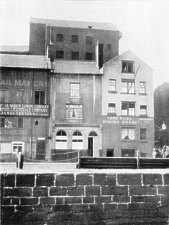 First Office in Liverpool |
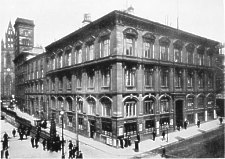 Present Liverpool Offices Ground Floor |
LIVERPOOL.—The office of Mark Quayle, the first Agent of the Isle of Man Steam Packet Company in Liverpool, was, very appropriately, on "Mann Island," at No. 15, in a street called Nova Scotia, which is parallel with Strand Street. This office, of which we give an illustration, is now occupied by " Jane Riley's Dining Rooms." " Mann Island " was formerly actually an island, separated from the rest of the town by Canning and George's Docks, and by water passages, the connection being by swing bridges (15).
The next office of the Company was that of its second Agent, James Duff, at 28. Brunswick Street.
Another move was made, in 1835, to the office of its third Agents, Messrs. Moore &: Christian, which was at 23, Redcross Street (formerly 6, Strand Street); and, in 1846, Mr. T. D. Moore was at 24, James Street (16), the present site of the " White Star " Line offices. Mr. Orford, on succeeding to the agency, remained in this office till about 1860, when he removed to the present office in Water Street(17).
(a) The Company's Minute Book.
(1) Their names will be found in Appendix B. See Frontispiece for a photograph of the present " Board."
(2) We refer to the Agents in Liverpool and Douglas only, the other agencies being comparatively unimportant.
(3) See page 5.
(4) We make use of the courtesy title of "Captain," the correct designation being "Master."
(5) The Tourist Vol. 1., page 12
(6) The Tourist Vol. 1., page 13.
(7) Ibid page 72.
(8) The Tourist, Vol. 1., pp. 136-7.
(9) Ibid; page 200.
(10) Manx Worthies, page 182. We have failed to obtain a likeness of Captain Skillicorn.
(11) The Tourist Vol. 1., page 134.
(12)17 and 18 Vict c. 104.
(13)
MASTER'S CERTIFICATE OF SERVICE
For Home Trade Passenger Ships.
Issued pursuant to the Act 17th and 18th Vic. cap. 104.
No. 120,051.
Number One Hundred and Twenty Thousand and Fifty-one.
EDWARD ROBINSON,
Born at Liverpool, County of Lancaster, in the year 1807. Has been employed in the Capacity of Master or years in the British Merchant Service in Home Trade Passenger Ships.
Bearer's Signature: E. ROBINSON.
Granted by the Registrar General of Seamen, London,
By Order of the Board of Trade,
WM. BROWN, Registrar.
Issued at Liverpool, this 28th day of April 1855.
p. pro R. AINLEY,
S. RENNELL.Any person forging, altering, or fraudulently using this Certificate, or allowing the s.ame to be used. is for each offence to be deemed guilty of a misdemeanour, and liable to imprisonment with Hard Labour for the term of Six Months. Any person, rather than the person to whom it belongs,becoming possessed of this Certificate, is requested to transfer it forthwith to the Registrar General of Seamen London.
From Mr. T. E. Edwardes).
(14) The Tourist, Vol. II., page 238.
(15) Its name was probably derived from that of the Isle of Man.
(16) The number afterwards appears as 32, which is due to a rearrangement of the street numeration.
(17) See illustration.
|
|
||
|
|
||
|
Any comments, errors or omissions
gratefully received The
Editor |
||